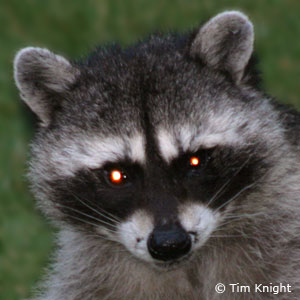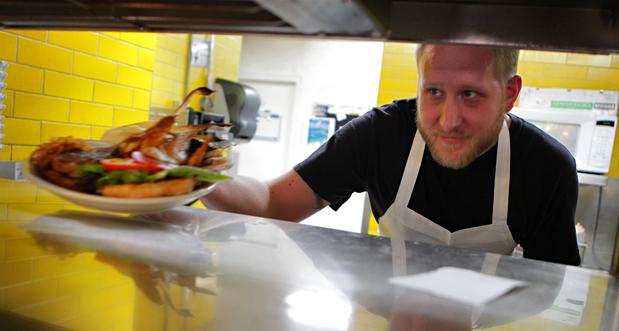In a form of logic that only the Brits could come up with, The Independent argues that if a recent listeria-related recall of turkey breast and ham by a Texas firm is casting doubt on Thanksgiving plans, then why not go for  exotic meats, like the deer and turkeys in my backyard in downtown Manhattan (Kansas).
exotic meats, like the deer and turkeys in my backyard in downtown Manhattan (Kansas).
Not quite sure how the editors at The Independent got to zoo animals in the headline.
Chef Dave Arnold, director of culinary technology at the International Culinary Center’s French Culinary Institute, blogs in a Nov. 8 blog entry written for Popular Science magazine’s Web site, that those who prefer tougher meat should enjoy wild game even more than standard meat and poultry, which he says are generally butchered young to ensure tenderness, and lack the flavor of their full-grown counterparts.
Arnold’s tastes are nothing new – during the Middle Ages, bear meat consumption was symbolic, and bear paws are still considered a delicacy in Cantonese cuisine. Beaver meat has been eaten by indigenous North American populations for generations.
Upscale Chicago eatery Moto served a road kill raccoon dish back in 2008, and this past June an Arizona restaurant owner caused a public uproar when he put lion burgers on his menu.
Exotic meats are generally avoided due to concerns over bacterial contamination and animal cruelty. However, in light of recent fears of listeriosis sparked by common meats found in neighborhood supermarkets, people may be more willing to step out of their comfort zones this Thanksgiving.
But no one got sick in the listeria positive recall cited in the story because at least someone was looking (in this case, U.S. Department of  Agriculture’s Food Safety Inspection Service). And the public was warned. Recalls are not the same as outbreaks.
Agriculture’s Food Safety Inspection Service). And the public was warned. Recalls are not the same as outbreaks.
Dave Arnold’s Low-Temperature Game Cooking Notes
In all cases sear the meat first and put into Zip-loc bags with butter. Cook in an immersion circulator for the prescribed times, then sear again for a minute or two per side on high heat.
Yak: cook at 56°C for 24 hours. Rich and gamey, with notes of duck.
Lion: 57°C for 24 hours. Tastes like pork but richer.
Black bear: 57°C for 3 hours. Tastes a little bloody and metallic. Younger bears are reportedly better.
 Beaver tail: 60°C for 48 hours. Woodsy, delicious.
Beaver tail: 60°C for 48 hours. Woodsy, delicious.
Duck, and birds that cook like duck (teal, widgeon): 57-58°C for 45 minutes to an hour for the breast. Braise the legs.
Squab: 56°C for 45 minutes for the breast. Braise the leg.
Raccoon: I recommend cooking raccoon in a traditional braise.
.jpeg) menu items, but not at the expense of safety.”
menu items, but not at the expense of safety.”
 And why aren’t there more lion-meat tacos?
And why aren’t there more lion-meat tacos?
 exotic meats, like the deer and turkeys in my backyard in downtown Manhattan (Kansas).
exotic meats, like the deer and turkeys in my backyard in downtown Manhattan (Kansas). Agriculture’s Food Safety Inspection Service). And the public was warned. Recalls are not the same as outbreaks.
Agriculture’s Food Safety Inspection Service). And the public was warned. Recalls are not the same as outbreaks. Beaver tail: 60°C for 48 hours. Woodsy, delicious.
Beaver tail: 60°C for 48 hours. Woodsy, delicious.